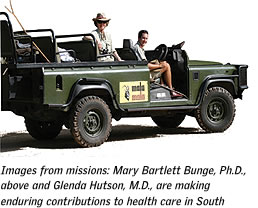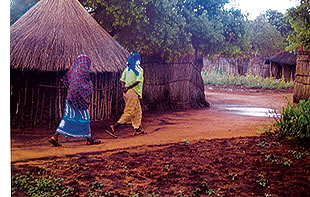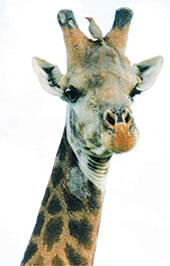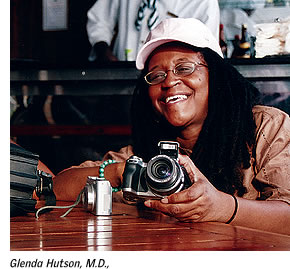Scientific Ambassador
 The office of internationally renowned
neuroscientist Mary Bartlett Bunge, Ph.D., is filled
with diplomas and awards,
some heralding her pioneering work in spinal cord repair.
Her newest certificate—from Mala Mala—isn’t
displayed yet, but she’ll gladly show it off and
divulge the related tale. The office of internationally renowned
neuroscientist Mary Bartlett Bunge, Ph.D., is filled
with diplomas and awards,
some heralding her pioneering work in spinal cord repair.
Her newest certificate—from Mala Mala—isn’t
displayed yet, but she’ll gladly show it off and
divulge the related tale.
Mala Mala, it turns out, isn’t a university or prestigious
body of scientists. It’s the game reserve the Miller
School of Medicine professor toured and photographed abundantly
while on a recent trip to South Africa.
 But as much as Bunge looked forward to
the up-close encounters with giraffes, lions, and leopards,
she
delayed the safari
sojourn for her primary purpose on the continent—to
serve among a delegation of women scientists participating
in the People to People Ambassador Program founded by the
late President Dwight D. Eisenhower. The visit to post-apartheid
South Africa was to learn about the country’s technological
innovations and science education. But as much as Bunge looked forward to
the up-close encounters with giraffes, lions, and leopards,
she
delayed the safari
sojourn for her primary purpose on the continent—to
serve among a delegation of women scientists participating
in the People to People Ambassador Program founded by the
late President Dwight D. Eisenhower. The visit to post-apartheid
South Africa was to learn about the country’s technological
innovations and science education.
“It was very interesting and very educational. I found South Africa a very
exciting place,” says Bunge, professor of cell biology and anatomy, neurological
surgery, neurology, and the Christine E. Lynn Distinguished Professor of Neuroscience
at The Miami Project to Cure Paralysis.
Over nine days, Bunge and ten other distinguished
U.S. women scientists met  with the Association of South
African Women in Science and Engineering,
various
researchers
and professors in Johannesburg and Cape Town, and toured several facilities,
including the GreenHouse People’s Environmental Centre, iThemba
Labs, and the LEAP Academy, the only privately funded math, science,
and technology school
in South Africa. Bunge and two other visiting scientists were so impressed
by the academy that they formed the Women in Science Endowment Fund to
raise money
for the school. with the Association of South
African Women in Science and Engineering,
various
researchers
and professors in Johannesburg and Cape Town, and toured several facilities,
including the GreenHouse People’s Environmental Centre, iThemba
Labs, and the LEAP Academy, the only privately funded math, science,
and technology school
in South Africa. Bunge and two other visiting scientists were so impressed
by the academy that they formed the Women in Science Endowment Fund to
raise money
for the school.
Spiritually Awakening Journey
 Glenda Hutson, M.D., had always wanted to see Africa.
For years she had visions of stepping onto the Motherland,
meeting people, eating exotic food, and absorbing the
rich culture. Glenda Hutson, M.D., had always wanted to see Africa.
For years she had visions of stepping onto the Motherland,
meeting people, eating exotic food, and absorbing the
rich culture.
But even before Hutson, an assistant clinical
professor of family medicine and community health at
the Miller
School, left for South Africa last spring, she felt
the long-awaited trip was also going to be spiritually
awakening.
The trip organizers, Supreme Esteem, a
South Florida-based motivational company, encouraged
participants to help
raise funds for an orphanage in Nyanga Township, a
poor Cape Town neighborhood. The group headed to South
Africa
with a $10,000 check for the Emasithandane Children’s
Project, the three-room group home for youngsters whose
parents were either too ill to care for them or had
died from tuberculosis or the AIDS pandemic.
“There were about 30-something children.
Some of them just went there to eat and then ended up
living there,” says
Hutson. “The culture is one where they take care
of their own.”
Hutson, her son Noah, and the rest of
the Miami group also visited Cape Town’s Philani Outreach Programme,
which supports children at risk of malnourishment, neglect,
HIV/AIDS, and other maladies; the mothers are taught
trades. “I said this trip was going to be about
enjoyment, but you start to think differently when you
see the need for health care, when you see so many people
with TB and HIV,” says Hutson, who also spent some
time on a safari, saw Victoria Falls, and toured a museum
in Zambia. Now, back home, she’s written to Philani
and is hoping to return as a volunteer physician. |